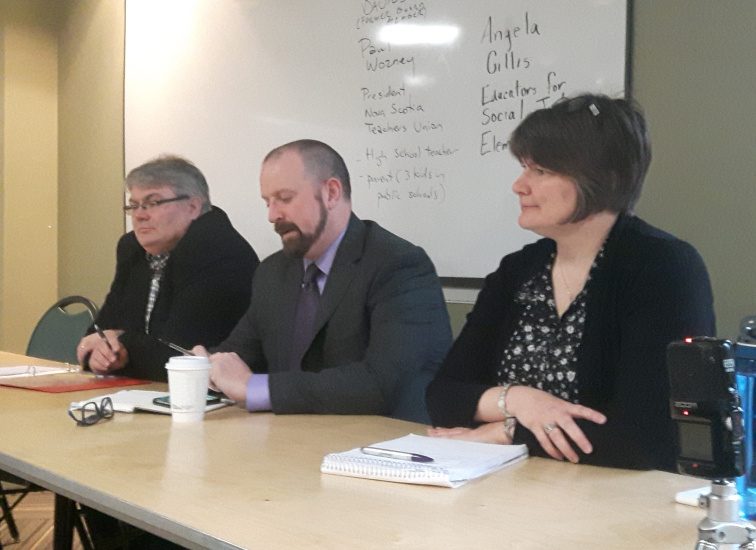
KJIPUKTUK (Halifax) – Lots of topics were discussed, but one common theme emerged at a town hall meeting on the state of public education at Mount Saint Vincent University in Halifax.
Speaker after speaker among the 40 or so attendants, parents, teachers, and professional support staff, all agreed that the promises of increased transparency and agility and better communication channels contained in the so-called Glaze report, published well over a year ago, are far from becoming reality.
And you only had to listen to the stories of exhausted parents fighting for inclusive education for their kids to recognize that this is causing real suffering.
Many parents talked about the difficulties they encounter getting the proper support for their children with learning disabilities. “You don’t get an Educational Program Assistant (EPA) unless the child is a flight risk. Meanwhile my kid can’t write,” one such parent said. “I don’t even understand who to go to anymore.”
Educators are equally exhausted.
I am responsible for five schools and way too many kids, said a behaviour specialist. One year I had only three schools, that was great. “Now I have 17 schools, and the government says that every one of our schools has a behaviour specialist. But it’s still just me!”
See also: ‘Demoralized and exhausted’ – Government ignores teachers at its peril, survey suggests
So what about those lines of communication that were to improve once school boards were eliminated?
“I have not seen any improvement. Parents are more frustrated than ever before, and decisions have become less site specific and no longer take cultural factors into account,” said panellist Angela Gillis, a teacher and activist.
The School Advisory Councils, the hyper-local school board substitutes, are not picking up the slack. Not only do they lack the power to foster real change, they’re not even in place in some schools, the ones that do often don’t publish minutes, and we don’t know how budgets are allocated, said moderator Trish Keeping, a member of the Facebook group Nova Scotia Parents for Public Education (NSPPE). And what the Provincial Advisory Council on Education is doing is anybody’s guess.
“School boards were far from perfect, but you had a way to communicate. That feedback mechanism has eroded, said panellist Paul Adam Davies, a former school board trustee in Cumberland County.
When we have these discussions on social media, we tend to focus on the bad. It’s important to have these discussions face to face, hence these town halls, Keeping said.
“We have to adopt a posture of listening and collaboration that puts the students first. Their stories have to be the drivers of change, and if we can’t show how the changes are resulting in success, in seeing struggling students thrive, than we need to make changes in a hurry, Wozney said.
“A relationship where everybody’s input is heard and valued and affirmed, that’s the kind of system that can respond to the needs of children,” said Wozney.
While Wozney was speaking in a broader sense, his words were equally applicable to the mood at the town hall, which was free from personal slights and acrimony.
This town hall was the first of several planned across Nova Scotia. The event was sponsored by the Nova Scotia Parents for Public Education, and Educators for Social Justice. A second town hall in the Halifax area is also in the works,
See also: Beyond the school: a parent reflects on the struggles of children with disabilities
With a special thanks to our generous donors who make publication of the Nova Scotia Advocate possible.
Subscribe to the Nova Scotia Advocate weekly digest and never miss an article again. It’s free!



